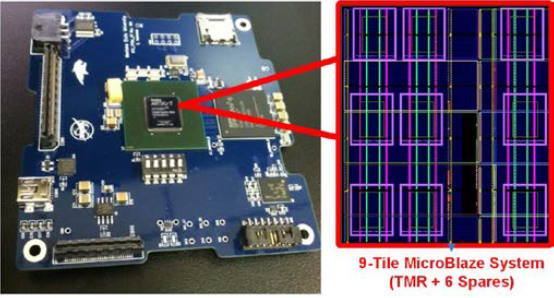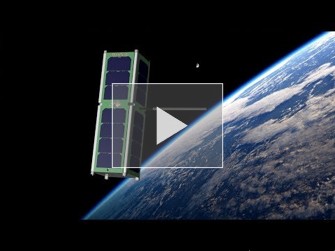Radiation tolerant computer proven to work for Aerospace Applications
A small lightweight computer that can resist damage from radiation exposure from low-orbit to deep space missions.
Background:
Radiation in space poses serious risk to computers on satellites and other spacecraft.
Typically, computers in aerospace applications require expensive, custom-designed
circuitry and shielding to fortify against radiation emitted by the sun and other
celestial bodies. Such designs drive up costs, add size and weight to specifications
and limit the ability to use Commercial Off-the-Shelf (COTS) technology.
As low-orbit satellite systems are deployed and commercial space companies are expanding,
there is a growing demand for a COTS solution to radiation hardening.
Description:
The MSU technology, RadPC, uses multiple inexpensive COTS computer processors known as Field-Programable Gate Arrays or FPGA’s. The FPGA’s operate in parallel, so that when a radiation particle disrupts one, the others recognize the fault, can take over the computation and reprogram to self-repair themselves.

RadPC self-repair is accomplished by having nine redundant array of processors so that spares can take over during radiation caused disruption and reprogram the system. At any given time, three of the cores run in triple modular redundancy (TMR) with the rest available as spares.
NASA support for the past ten years has enabling the MSU team to bring the RadPC to
high Technology Readiness Level of TRL-8 through deployment in high-balloons and sounding research rockets.
In 2019 the RadPC was launched in a small satellite (CubeSat) mission from the International
Space Station and remains in orbit today. The success of these projects has resulted
in the RadPC being selected by NASA to be part of a lunar payload in 2021 to demonstrate
that it can withstand solar and other radiation deep space and have the potential
to be part of a future Mars manned mission.
Benefits:
- Low cost solution
- Allows Commercial Off the Shelf (COTS) software
- Light weight
- Advanced Technology Readiness Level of TRL-8
Video:

Opportunity:
- Collaborate with ongoing research program with lunar mission deployment in 2021
- Schematics and FPGA code available for licensing
- Researchers are available for consultation and R&D projects
Contact:
Nick Zelver
(406) 994-7706
nzelver@montana.edu
